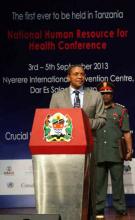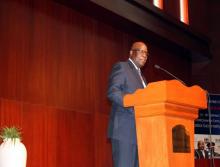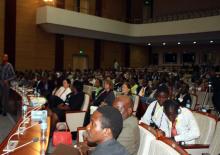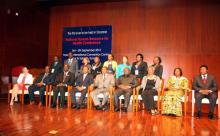The United Republic of Tanzania hosts the National Human Resource for Health Conference with the theme: "Health workforce: Crucial to meeting development goals", 3rd - 5th september, 2013
On the 3rd-5th September, 2013, the government of the United Republic of Tanzania for the first time held the National Human Resource for Health Conference in Dar es Salaam. The three days conference officiated by His Excellency, Dr. Jakaya Mrisho Kikwete, President of the United Republic of Tanzania gathered 250 participants and speakers representing national, regional and local government agencies; regulatory bodies and professional associations; faith-based and private-for-profit organizations; civil society organizations; international non-governmental organisations; and development partners including staff from WHO, USAID, CIDA and GIZ.
Other important dignitaries present at the conference include: the Former President of the United Republic of Tanzania, Hon. Benjamin Mkapa, the Minister for Health and Social Welfare, Hon. Dr. Hussein Mwinyi, the Minister of State-President’s Office Public Service Management (PO-PSM), Hon. Celina Kombani (MP), the Deputy Minister of State Prime Minister’s Office Regional Administration and Local Government (PMO-RALG), Hon. Kassim Majaliwa (MP), the WHO Representative, Dr. Rufaro Chatora, the President & CEO of Intrahealth International, Mr. Pape Gaye and the USAID Mission Director, Ms. Sharon Cromer.
The President of the United Republic of Tanzania in his address congratulated the conference organisers for choosing a theme very timely as the country takes the final lap towards the target date for the Millennium Development Goals. His speech went on to recognize progress made in addressing the challenge of human resource for health citing initiatives such as the National Human Resource for Health Strategic Plan III (2008-2013), the Health Sector Strategic Plan III (2009-2015) and the Primary Health Services development Programme (2007-2017). The President also called upon the Ministries of Health and Social Welfare, the President’s Office Public Service Management, the Prime Minister’s office – Regional Administration and Local Government, the Ministry of Education and Vocational Training and the Ministry of Finance to work together to find sustainable solutions to the challenges facing the health sector. He concluded by urging participants to use the conference as a learning ground and platform for exchanging ideas on implementing and scaling up sustainable solutions to the HRH crisis.
Dr. Rufaro Chatora, WHO Representative, began his remarks by defining a health worker to include all people engaged in actions whose primary intent is to enhance health. He commended the Ministry of Health and Social Welfare for hosting such an important gathering and recognized the efforts of global community in addressing the HRH crisis. His speech elaborated on the key principles underlying the concept of Universal Health Coverage. He called on the Ministries of Health, Public Service, Local Government and Finance to work together to understand the health labour market dynamics and propose innovative solutions to the many and diverse health workforce problems. He called on the conference participants to deliberate on the quantity of human resources that the country can afford now, in the medium and long term as well as the mechanisms for accreditation, regulation and certification of health professions. Dr. Chatora concluded by urging the conference participants to use the platform to learn from the experiences of Regions and Districts which are performing better than others in terms of human resources availability and management of the health services.
Similar sentiments were echoed in remarks delivered by representatives from Intrahealth International and USAID.
Over the course of three days, participants had an opportunity to:
- Share evidence-based best practices from a wide variety of HRH initiatives in the public, faith-based, and private sectors
- Discuss ways to accelerate the implementation of existing policies on recruitment, retention, performance, education, training and management of the health workforce
- Identify and advocate for key priorities and increased resources, both national and international, to be incorporated in the new National HRH Strategic Plan (2014-19)
- Propose and advocate for national commitments to be declared by the Tanzania delegation at the 3rd Global Forum for HRH in November 2013
The following were some of the key recommendations for the five thematic areas:
HRH Planning and Recruitment
- Promote integrated planning and recruitment including involvement of the private sector.
- Review the retirement age for health staff given the current concern on early retirement of energetic health staff.
- Harmonize existing HRH data systems including the public and the private sector.
HRH Retention
- Explore opportunities to use task shifting and task sharing to address HRH shortage including development of policy and implementation framework.
HRH Performance Management and Productivity
- Link OPRAS to accountability process to improve productivity.
- Invest in capacity building for Human Resource managers at all levels including the private sector.
HRH Production
- MOHSW to establish an independent oversight body for regulation of health care professionals to oversee licensing, accreditation, training and scope of practice.
- Government to dedicate financial support to health training institutions funded from available local resources such as BHF.
- MOHSW in collaboration with PMORALG and PO-PSM to convene national stakeholder dialogue to obtain consensus on community health workers’: policies and strategies for training, assessment and regulation of CHWs.
Cross-cutting issues: Coordination, Financial Sustainability and the Role of the Private Sector
- The four key ministries (MOHSW, PMORALG, PO-PSM and MOF) to convene regular inter-ministerial dialogues to track HRH progress, lessons and challenges.
The United Republic of Tanzania hosts the National Human Resource for Health Conference







